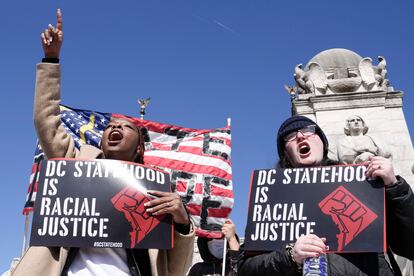Washington DC reignites debate on statehood
A Senate vote to overturn a district crime law has kicked a political hornet’s nest in the US over self-determination, racial discrimination and crime


Washington, DC, the capital of the United States, “is not a city,” said White House spokesperson Karine Jean-Pierre last week. Nor is it a state, she declared in one of her daily press conferences. The singular status of the US capital, a federal district with no voting rights in Congress, has often aroused controversy and sparked local demands for statehood. This week, a Senate vote that struck down a district crime bill kicked a political hornet’s nest, stirring up issues like the capital’s right to self-determination, racial discrimination and approaches to fighting crime.
On March 8, Senate Republicans and Democrats voted 81 to 14 to overturn the district’s Penal Code reforms that the Washington, DC City Council had approved almost unanimously in November 2022. The reforms lowered penalties for some crimes, such as car theft. It is the first time in 30 years that Congress has used its prerogative to override a local law in the capital. Democratic support for this Republican bill signaled a shift in that party’s traditional support for DC statehood.
The Senate vote reflects its growing concern about rising violent crime nationwide since the beginning of the pandemic. According to local police data, violent crime in DC is up 8% over last year; homicides are up 33%; and vehicle thefts are up 108%. Mayor Muriel Bowser also vetoed the reform in January. “Every time a measure is introduced that reduces prison sentences, it sends the wrong message,” said Bowser. Before the vote, Senate Minority Leader Mitch McConnell (R-Kentucky) said, “We are talking about our capital – local politicians have let their streets become a danger and an embarrassment.”
Crime will become a major issue in the 2024 presidential election, which is widely expected to be a close race. Rising crime in other large American cities has toppled once-popular leaders like Chicago Mayor Lori Lightfoot, who lost her primary in February because of the city’s escalating violence.
President Joe Biden, who is expected to announce his candidacy for reelection soon, wants to avoid looking like he’s soft on crime. Biden tweeted, “I support self-determination and statehood for DC, but I do not support some of the changes the City Council has passed over the Mayor’s objections, such as lowering penalties for carjacking. If the Senate votes to overturn what the DC Council did, I’ll sign it.”
Many Democrats support statehood for the cosmopolitan District of Columbia and view Biden’s politically calculated statement as a betrayal. With half a million primarily Black and progressive residents, politics is a way of life in DC and its raison d’être. “Taxation without representation” is stamped on the license plates of local vehicles. After the Senate vote, Brian Schwalb, DC’s Attorney General, declared, “Attempts to substitute the will of district residents for that of federal politicians elected hundreds of miles away violates the basic principles and freedoms upon which this country was built.”
The dilemma for Democrats goes beyond the statehood issue to the party’s relationship with Black voters, a significant component of their base. The Senate vote and Biden’s about-face will add to their long list of grievances.
Critics of the crime bill override say it is another case of a White-majority legislative body imposing its will on a Black-majority population. The Missouri House of Representatives recently passed a bill that would put the St. Louis Metropolitan Police Department under the control of Republican Governor Mike Parson. A White supermajority of the Mississippi House voted to create a separate court system and an expanded police force within its capital city – Jackson – that would be entirely appointed by state officials. In Georgia, the State Election Board appointed a bipartisan panel to investigate elections management in Fulton County, one of the most populous counties in Georgia with a Black majority. As the signs carried by protestors at the Capitol Building on March 8 said, “DC statehood is racial justice.”
Advocates of the criminal law reform say it strengthened due process and corrected problems that disproportionately affect the Black population in DC, problems seen in many other US cities. They say the Senate vote and eroding support for self-determination has more to do with political posturing than anything else. “Overturning our democratically established local laws – the product of more than 10 years of collaborative work by judges, experts and law enforcement officials – without an independent analysis or alternative proposal is not only undemocratic, it’s lazy.”
Marc Morial, president of the National Urban League, said, “The citizens of the District of Columbia should have the same right or self-determination as every other American. Washington, DC… does not deserve to be treated as a colony by the United States Congress. Statehood for DC is long overdue.”
Sign up for our weekly newsletter to get more English-language news coverage from EL PAÍS USA Edition
Tu suscripción se está usando en otro dispositivo
¿Quieres añadir otro usuario a tu suscripción?
Si continúas leyendo en este dispositivo, no se podrá leer en el otro.
FlechaTu suscripción se está usando en otro dispositivo y solo puedes acceder a EL PAÍS desde un dispositivo a la vez.
Si quieres compartir tu cuenta, cambia tu suscripción a la modalidad Premium, así podrás añadir otro usuario. Cada uno accederá con su propia cuenta de email, lo que os permitirá personalizar vuestra experiencia en EL PAÍS.
¿Tienes una suscripción de empresa? Accede aquí para contratar más cuentas.
En el caso de no saber quién está usando tu cuenta, te recomendamos cambiar tu contraseña aquí.
Si decides continuar compartiendo tu cuenta, este mensaje se mostrará en tu dispositivo y en el de la otra persona que está usando tu cuenta de forma indefinida, afectando a tu experiencia de lectura. Puedes consultar aquí los términos y condiciones de la suscripción digital.








































